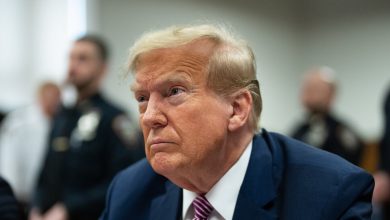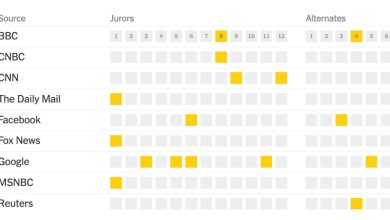Long After They Drove Away, Canada’s Truck Blockades Have a Political Champion

OTTAWA — Canadians were shocked when a group of truckers rolled their rigs into the nation’s capital earlier this year, paralyzed the downtown area for weeks and demanded that the government lift all pandemic-related restrictions.
The demonstrations spread to border crossings, forcing car manufacturing plants to shut down and disrupting billions of dollars in trade with the United States. In the end, the prime minister took the extraordinary step of invoking an emergencies act allowing the government, among other things, to freeze protesters’ bank accounts.
But that was then.
Now, the truckers and their supporters have become an important constituency and are being courted by the country’s Conservative Party, Prime Minister Justin Trudeau’s main political opposition.
Many in the party are busy rewriting what happened on those chaotic days in February, glossing over the blockades’ illegality and an arms cache found at a protest in Alberta where the authorities said protesters were ready to use violence to block a border crossing there.
And several would-be Conservative leaders are fighting each other to be seen as the true defender of the truckers and their claims that Canadians have lost their freedoms.
“The truckers have more integrity in their pinky finger than you had in your entire scandal-plagued cabinet,” said Pierre Poilievre, the front-runner for the now vacant party leadership as he challenged a former Quebec premier, Jean Charest, in a debate last week.
With its multiparty system, Canada is not known for the kind of zero-sum politics that has come to define political life in the United States. But that is a narrative that obscures the struggles and intrigue that animates the contest for power in the country. That is especially true after the last elections in October, when Mr. Trudeau was returned to power for a third term as prime minister, with the far right party again failing to take any seats in the parliament.
The Conservatives, the only other party to form a government in Canada, are readying for a fight and see the truckers and their followers not as outcasts, but as political currency that can bring in votes — and money.
“We should support our truckers and stand up for their freedoms,” Mr. Poilievre said at a recent rally in Ottawa.
Canada’s next federal election is expected in 2025, which in the world of politics is an eternity. Anything can happen between now and then. But there are two factors that have unnerved some of those close to the current Liberal Party government.
One is simply the issue of time in power. Gerald Butts, a close friend of Mr. Trudeau and a former top political adviser, noted that Mr. Trudeau will have been in power for 10 years by then.
“If the Liberal Party looks old and tired at that time, voters will give a really hard look at the available alternatives,” he said.
The second factor is, in a word: Truckers (or at least, what they represent.)
The truckers may have a relatively small following and may, in political terms, be seen as outsiders. But they have a highly motivated following that is angry, excited, engaged and eager for change.
Taken together, Mr. Butts said, that is cause for concern among the Liberals.
“In that scenario the public will be really looking for a change,” Mr. Butts said.
But for now, the contest is unfolding within the Conservative Party itself as Mr. Poilievre presents himself as the true inheritor of the truckers’ movement.
And it seems to be working.
At last week’s debate, several of the five candidates who were there argued that they were the fiercest backers of the truckers.
“You did not speak up until it was convenient for you to speak up,” Leslyn Lewis, a social Conservative now in her second campaign for leader, said to Mr. Poilievre.
The one candidate opposed to the protests, Mr. Charest, the former Quebec premier who left political retirement to seek the party’s leadership, was jeered for condemning the truckers.
“There is a very real line to be drawn here: if you are a legislator, you cannot support a blockade, you cannot support people breaking the law,” Mr. Charest said in a recent interview.
At the debate, he was the only one clearly expressing that position. One candidate who was absent, Patrick Brown, the mayor of a suburban Toronto community and former member of Parliament, spoke out against the blockade in February.
The blockade began as a modest convoy of truckers and hangers-on that set out from Western Canada with a specific target: a Canadian rule that mirrored American law by requiring truck drivers returning from the United States to be vaccinated.
As the blockade traveled east to Ottawa and spurred copycat groups in other regions, the complaints of its members expanded to include all pandemic restrictions and general disaffection with government and Mr. Trudeau.
Ottawa’s police force, believing that the group would be staying only for a weekend, waved the trucks downtown toward the streets surrounding Parliament.
That assumption was devastatingly wrong. The police chief, who resigned during the nearly month long blockade, admitted that his overwhelmed force had lost control of the city. The city’s mayor and the premier of Ontario both declared states of emergency as the protest spread to include a vital bridge crossing from Detroit that carries more than $300 million in trade a day.
After Mr. Trudeau turned to the Emergencies Act for the first time in history and reinforcements from the Royal Canadian Mounted Police and other law enforcement agencies from across the country poured into town, the streets were finally cleared over two days. More than 200 people were arrested, including several of the convoy organizers, and money raised by the group was seized. No case has yet gone to trial.
Outside Canada, the demonstrators were hailed by far right groups as far as Holland, which staged sympathy protests and members of the right in the United States and elsewhere donated millions of dollars online to the protest, little of which ultimately made its way to the protesters.
The paralysis of the national capital for weeks and the protracted failure of the police to restore order drew global attention and stunned Canadians who, by and large, had never seen anything like it before.
“By any sensible definition this was a massive, illegal occupation,” Marco Mendicino, the public safety minister told a parliamentary committee late last month, adding: “I’d say the emergency in late January and through February was unprecedented because all the blockades occurred at the same time. We’d never seen that degree of disruption on Ottawa streets.”
So it is especially surprising to some to find mainstream Conservatives, traditionally a law and order party, now pursuing the protest movement. One possible clue could be found in last year’s vote. The party was led by a moderate who angered those on the right by backtracking on issues like easing gun controls while, at the same time, largely failing to win over voters in the center.
Now Conservatives like Mr. Poilievre are trying to follow the same kind of strategy as Republicans in the United States, catering to a loosely organized movement that claims to speak truth to power, but whose supporters’ concerns over what they see as a changing world are often fueled by conspiracy theories and nationalism.
That embrace may allow Mr. Poilievre or someone else to take over the party in which the vote for leadership is limited to a small number of Canadians who purchase memberships. But some analysts warn that it’s less certain to resonate with the broader Canadian public in a general election.
“The key for Canadian politics is that no party wins with just its base,” said Melanee Thomas, a professor of political science at the University of Calgary in Alberta. “This is a short term strategy, because the rhetoric of the convoy, the super charged language, the hyper partisanship is going to be pretty off-putting to somebody who is nonpartisan.”
Still, Mr. Butts, the former Liberal strategist, said those kinds of arguments may not apply in the next vote.
“If I were in my old job,’’ he said, “I would not be assuming that Poilievre can’t win a general election.”




